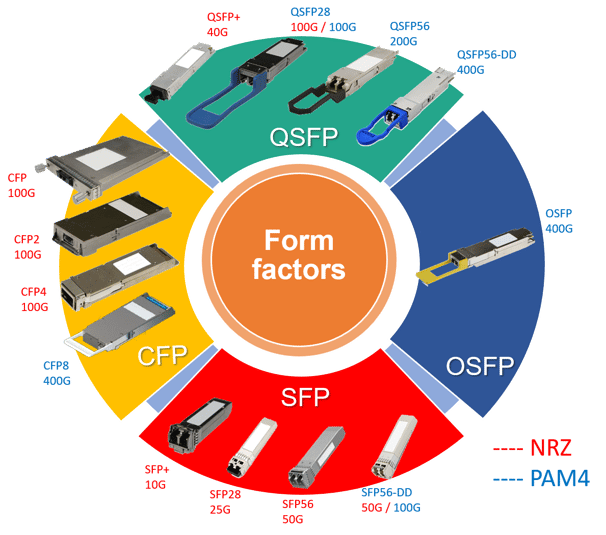Introduction to NRZ and PAM4
Non-Return to Zero (NRZ)
- NRZ is a binary (two levels) modulation represented by logic 0 and logic 1
- NRZ transmits one bit per symbol
- NRZ modulation served as the base of modern high-speed interfaces until 2012
- NRZ is PAM2 with 1 bit/symbol
Pulsed-Amplitude Modulation 4 levels (PAM4)
- PAM4 encodes four levels, represented by four combinations of
two bits logic: 00, 01, 10 and 11. - The PAM4 eye diagram presents three eye openings and four levels.
- PAM4 transmits 2 bits per symbol, therefore the Baud rate is
twice the bits per second


PAM4 vs NRZ
- PAM4 doubled the density of data vs NRZ in same time period
- 28Gbps NRZ vs 28GBd PAM4 --> 28GBd PAM4 = 28G * 2 bits = 56 Gbps
- 56Gbps NRZ vs 56GBd PAM4 --> 56GBd PAM4 = 56G * 2 bits = 112 Gbps
- PAM4 reduces the # of transmission lanes & # of fibers compared to NRZ

Note 1:
400Gbps is obtain with:
8x I/O Lanes of 28GBd (53 Gbps/lane)
4x I/O Lanes of 56GBd (112 Gbps/lane)
Customers will have to specify which one
they are interested in (if not both).
Note 2:
The SNR is divided by a factor of 3 with PAM4. FEC required to maintain optical budget.
Symbol transition NRZ vs PAM4


NRZ
2 symbol’ transitions with none
return to zero when 2 consecutive 1s
PAM4
16 symbol’ transitions 6 different
rise and fall times
PAM2: 1 bit/symbol
PAM4: 2 bit/symbol
Challenges introduced by PAM4
- Analyzing and debugging 4-level systems is more complex (16 symbol transitions!)
- PAM4 signal is more susceptible to noise:
- Signal to Noise divided by 3 compared to NRZ
- PAM4-based units consume higher power than a transceiver supporting NRZ because of the need for more advanced equalization
400G interface rate vs lane vs Baud rate
Module type | # of I/O lanes | Electrical I/O | I/O Baud rate | Module bandwidth |
400GBASE-LR8 | 8 | 50Gbps – PAM4 | 25G | 400Gbps |
400GBASE-FR8 | 8 | 50Gbps – PAM4 | 25G | 400Gbps |
400GBASE-DR4 | 4 | 106.25Gbps – PAM4 | 53G | 400Gbps |
400GBASE-SR16 | 16 | 26.56Gbps – NRZ | 26.56G | 400Gbps |

BER tester: Typical applications
Optical transceivers leverage NRZ and PAM4 technology to generate traffic.
- NRZ-based pluggables: From 10G to 100G
- PAM4-based pluggables: From 50G or 100G to 400G
NRZ units still relevant because of 5G rates (25G & 50G)

